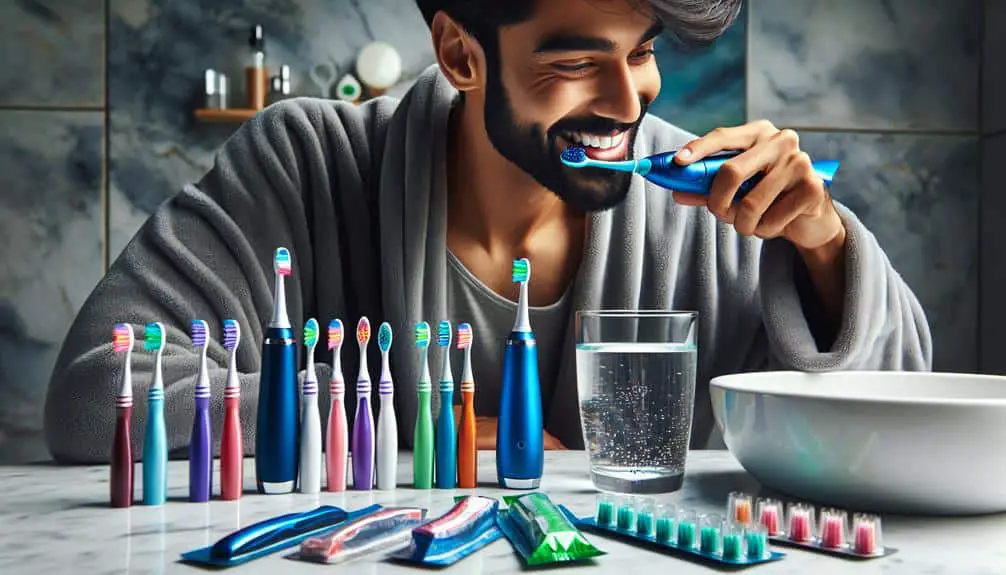To maintain white teeth and achieve bright smiles, focus on your diet by including enamel-strengthening nutrients found in crunchy fruits, vegetables, dairy products, and natural remedies that promote saliva production. Hydrate well throughout the day with water to wash away food particles and maintain a vital pH level in your mouth, preventing dry mouth and bad breath. Proper brushing technique for at least two minutes with whitening toothpaste is essential for removing surface stains, while avoiding staining foods and drinks like coffee, tea, and red wine will help prevent discoloration.
Remember to schedule routine dental check-ups for early detection of oral health issues and personalized advice on oral hygiene practices. Consistency in these lifestyle habits is key to maintaining white teeth.
Key Points
- Eat enamel-strengthening foods like dairy products and crunchy fruits
- Stay hydrated with water to rinse away particles and maintain pH levels
- Brush properly with whitening toothpaste for plaque removal and stain prevention
- Avoid staining beverages like coffee and use straws when consuming them
- Schedule regular dental check-ups for early detection and professional cleanings
Healthy Diet for Whiter Teeth
To accomplish whiter teeth, maintaining a diet rich in enamel-strengthening nutrients is crucial. Natural remedies such as crunchy fruits and vegetables like apples and carrots can help scrub away surface stains while promoting saliva production, which aids in rinsing away food particles that may cause discoloration. Moreover, dairy products like cheese and yogurt are high in calcium and phosphates, which can help remineralize enamel and make teeth stronger and whiter.
Professional whitening treatments can also be advantageous in achieving a brighter smile. Dentists offer various options such as in-office procedures and take-home kits that can effectively lighten teeth several shades. These treatments use safe and regulated concentrations of whitening agents to break down stains and discoloration, providing noticeable results.
Incorporating these enamel-strengthening nutrients into your diet, along with considering professional whitening options, can significantly contribute to maintaining white teeth while promoting overall oral health. Remember, a healthy diet and professional dental care go hand in hand in achieving a radiant smile.
Hydration Habits and Oral Health
For ideal oral health and overall well-being, maintaining proper hydration habits is essential. Adequate water intake is vital for a healthy mouth and can greatly impact the whiteness of your teeth. Here are some key points to keep in mind:
- Water intake: Drinking water helps wash away food particles and bacteria that can lead to plaque buildup and tooth decay. It also helps stimulate saliva production, which is important for protecting your teeth against acids and maintaining a neutral pH level in your mouth.
- Hydration benefits: Staying hydrated keeps your mouth moist, preventing dry mouth that can contribute to bad breath and an increased risk of cavities. Water is the best beverage choice for your oral health as it contains no sugars or acids that can harm your teeth.
- Timing matters: Sip water throughout the day, especially after meals, to help rinse your mouth and neutralize acids produced by bacteria.
- Consistency is key: Make hydrating a habit by carrying a reusable water bottle with you and setting reminders to drink water regularly.
Importance of Regular Brushing
Regular brushing is a crucial practice for maintaining white teeth and excellent oral hygiene. To guarantee best results, it's vital to follow a proper brushing technique. When brushing, hold your toothbrush at a 45-degree angle and use gentle circular motions to clean all tooth surfaces thoroughly. Pay special attention to the gum line, where plaque tends to accumulate. Brushing should last at least two minutes to allow for sufficient plaque removal.
Using a whitening toothpaste can also improve the effects of regular brushing. These toothpastes contain ingredients that help remove surface stains, resulting in a brighter smile over time. However, it's crucial to mention that whitening toothpaste is more effective at preventing new stains rather than removing deep-seated discoloration.
Incorporating regular brushing with proper technique and a whitening toothpaste into your daily oral care routine can significantly contribute to maintaining white teeth and promoting overall oral health. Remember, consistency is key when it comes to achieving and preserving a bright smile.
Avoiding Staining Foods and Drinks
Mindful consumption of foods and drinks that are prone to staining can help preserve the whiteness of your teeth. When aiming to maintain a bright smile, it's important to be cautious of what you consume. Here are some tips to help you avoid staining foods and drinks:
- Limit Coffee and Tea: These beverages contain compounds that can discolor your teeth over time. If you can't completely avoid them, consider using a straw to minimize contact with your teeth.
- Be Cautious with Red Wine: Red wine is notorious for staining teeth due to its high tannin content. Rinse your mouth with water after enjoying a glass to help reduce its staining effects.
- Watch Out for Berries: While berries are nutritious, they can also stain your teeth. Brushing or rinsing your mouth after eating berries can help prevent staining.
- Moderate Intake of Dark Sauces: Dark sauces like soy sauce and balsamic vinegar can contribute to teeth staining. Try using lighter alternatives or consuming them in moderation.
Routine Dental Check-Ups
To maintain excellent oral health and prevent any potential issues, scheduling routine dental check-ups is essential. Regular visits to your dentist are vital for the early detection of any oral health problems, such as cavities, gum disease, or oral cancer. The importance of these check-ups can't be overstated, as they allow for timely intervention and treatment, ultimately preserving your bright smile.
The benefits of routine dental check-ups extend beyond just oral health. By visiting your dentist regularly, you can also receive professional cleanings that help remove plaque and tartar buildup, preventing issues like tooth decay and gum disease. Additionally, these appointments provide an opportunity for your dentist to offer personalized advice on maintaining good oral hygiene practices at home.
When considering scheduling your dental appointments, it's recommended to follow your dentist's guidance regarding the frequency of visits. Factors such as your overall oral health, any existing conditions, and your risk of developing oral problems will influence how often you should schedule routine check-ups. By adhering to a consistent dental check-up schedule, you can proactively care for your teeth and gums, ensuring a radiant smile for years to come.
Frequently Asked Questions
Can Genetics Play a Role in the Color of My Teeth, Even if I Maintain a Healthy Lifestyle?
Genetic predisposition can indeed affect tooth color, regardless of your healthy habits. Lifestyle factors, like avoiding staining foods and beverages, can help maintain white teeth. Environmental influences and consistent dental care also play a role in tooth color.
How Can Stress and Anxiety Impact the Whiteness of My Teeth?
Stress management is essential for keeping your teeth white. High stress levels can lead to teeth grinding and poor dental care habits. Proper nutrition and teeth whitening routines are imperative. Remember, maintaining a calm mind contributes to a bright smile.
Are There Any Natural Remedies or DIY Methods That Can Help Whiten Teeth?
For natural teeth whitening, consider oil pulling with coconut oil, using activated charcoal powder cautiously, or making a paste of baking soda and hydrogen peroxide. Remember to consult with a dentist before trying any DIY methods.
Can Certain Medications or Medical Conditions Affect the Color of My Teeth?
Certain medications and medical conditions can indeed impact the color of your teeth. Dietary habits play a role in teeth color, while smoking is known to cause teeth discoloration. Consult your healthcare provider for personalized advice.
Is It Possible to Over-Brush or Over-Whiten My Teeth, and What Are the Consequences of Doing So?
Brushing and whitening excessively can weaken enamel, leading to sensitivity and damage. Follow proper techniques using a soft-bristled brush and gentle motions. Limit whitening to avoid enamel erosion. Consult your dentist for personalized guidance.



